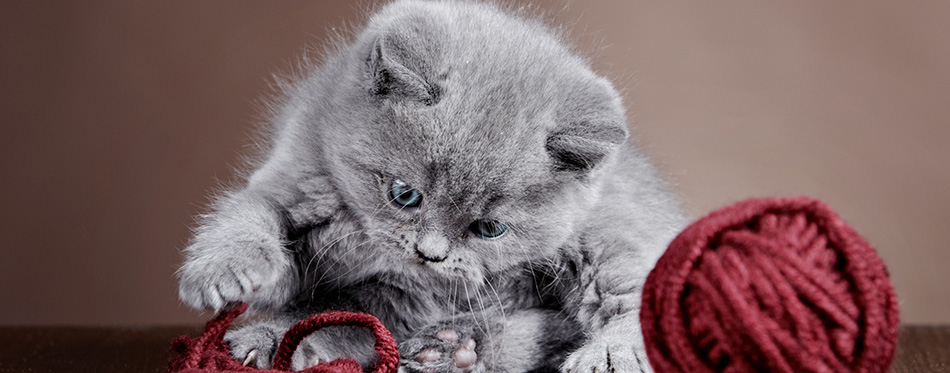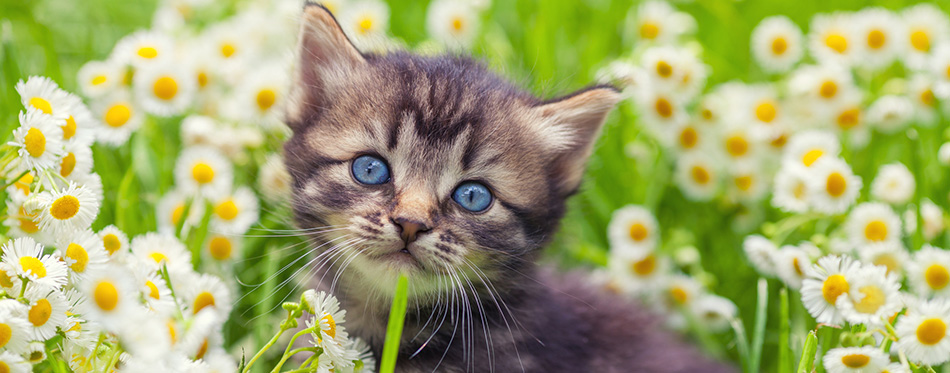Picture a kitten in your head for a moment. We bet she’s wide-eyed, energetic, and engaged in a game of cat and mouse, isn’t she? However, there is an early stage when baby kittens are helpless – and completely incapable of doing anything for themselves. Only a small minority of people are privileged enough to witness this stage and marvel at the fragility of life.
However, looking after baby kittens from birth can also be wildly intimidating. How can you even begin to meet the various needs of a newborn mammal so tiny they fit in the palm of your hand? And right at the top of owners’ worry lists is the fear that their litter of kitties hasn’t yet opened their eyes. Not to worry; this is entirely normal, given the age and stage of your newborns. In this article, we’ll guide you through what milestones you should expect your kitties to reach at certain points in their lives, and how to protect their delicate eyes from harm.

When do Kittens First Open Their Eyes?
Your kittens should begin to open their eyes and see the world between one week to a week and a half. Don’t expect a kitten to open their baby-blue eyes wide to then be able to see the world clearly from that point onwards. Actually, it will take a kitten a couple of days to fully open their eyes. Even when they succeed, a kitten’s vision will remain blurry for several weeks at least. It takes a kitten this long to open their eyes as they aren’t born with properly developed irises in their eyes – put differently, the muscle that contracts and expands the pupil, controlling how much light is let in, is under-developed.
It’s a well-accepted theory that different breeds open their eyes at different times. Rumor has it that bicolor cats (aka. tuxedo cats) open their eyes 24 hours before the average kitty. However, this could be less to do with science and more to do with the implicit bias of cat parents!
Are Kittens Born Blind?
Kittens aren’t only born blind. These loveable little furballs are also born deaf, too. Your little kitten will obtain their sight before they can hear, yet both senses should have developed after two weeks post birth.
Another adorable fact about kitten’s eyes that we couldn’t resist sharing is that every kitten will be born blue-eyed. Why so? As it is the natural pigment melanin that makes eyes, hair, and skin darker, a newborn kitten’s lack of melanin is the reason that newborns wow us with their striking blue eyes.
What if My Kitten Doesn’t Open Their Eyes After Two Weeks?
Although the average amount of time for a kitten to open their eyes is between 7-10 days, it may take some kittens a little more time to catch up with their siblings. However, if there have been no signs that a kitten may open their eyes after two weeks, this is indicative of a possible eye infection.
One home remedy that we swear by is taking a damp washcloth soaked in warm water to wipe your kitten’s eyes with after they’ve surpassed the 14-day mark in an attempt to eradicate any minor infections that may be stopping them from opening their eyes. Before attempting this home remedy, always make sure that the mother cat is completely comfortable with you handling her kittens. If she trusts you to touch her newborns, always do so with gloves. If nothing changes, we recommend taking this newborn to the vet in order to get to the crux of the problem.
Whatever you do, never try to prize your kitten’s eyes open. The opening of a kitten’s eyes is a natural process that humans should never try to expedite. Forcing a kitten’s eyes open may blind them due to their sensitivity to light.
How to Protect Your Kitten’s Delicate Eyes
- Try to avoid spraying insect sprays around the house: Having constant bugs buzzing around your home is, indeed, extremely aggravating. However, you’re going to have to learn to live with them with kittens around the house. Their delicate eyelids may react badly to these noxious chemicals.
- Use “tearless” shampoos when shampooing your kitten: Unlike normal shampoos that contain surfactants (surface active agents), tearless shampoos leave out surfactants such as sodium lauryl sulfate that irritate the eyes. Although normal shampoos do work effectively by removing the layer of sebum oil, kittens aren’t exactly bothered that their coat isn’t at its full shine potential. All they want is for their eyes to be protected!
- Keep newborn kittens in a dimly lit environment: As a kitten’s vision will be blurry for the first few delicate weeks of their lives, keep them away from bright lights.
Related Post: Cat Shampoos
Detecting Subsequent Eye Problems
If your kitten becomes visually impaired, you’ll hopefully be able to pick up on it pretty quickly due to the obvious behavioral changes they’ll exhibit. Bumping into furniture, tripping up as they try to climb stairs, and having difficulty locating their litter boxes are only a few of the indications that your kitten may be suffering from visual impairment.
Likewise, knowing how your kitten’s eyes are meant to look is critical. A healthy kitten will have healthy pink tissues lining their eyelids and little to no tearing in their corners. Although a kitten’s eyesight isn’t fully developed for the first few weeks of their lives, this does not mean that their eyes themselves should be cloudy. Actually, cloudy lenses in kitten’s eyes is a sign of upper respiratory infections, injury, or feline keratitis, in comparison to a healthy kitten’s eyes which will be bright and shiny. That’s why it’s important to ensure all kittens from your cat’s litter pay regular visits to the vet so they can detect any underlying eyesight conditions.

Our Final Thoughts
Although we’ve certainly given you a lot to think about, try to relax as much as you can in these first few weeks of your kittens’ lives. It’s wonderful to observe their distinctive personalities develop and watch them slowly discover the world around them!
Sources:
- How Old Is That Kitten? Kitten Progression: At-a-Glance – Alley Cat Allies
- Hello, World! All About When Kittens Open Their Eyes – Michelson Found Animals

